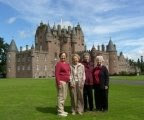Tour Scotland Culloden Battlefield Video. Culloden Battlefield, near Inverness, Scotland. On the sixteenth of April 1746, this bleak moor saw the end of the Jacobite Rising of 1745 when the army of Prince Charles Edward Stuart was defeated by a government army under the Duke of Cumberland.
Tales of Culloden. Culloden was the last battle on British soil. It marked the end of clan culture and was the harbinger of the Highland Clearances. It ensured the inevitability of the American Revolution and increased the outpouring of Scots across the globe. It is the only battle that British Army regiments are not permitted to include in their battle honours; the only battle that Bonnie Prince Charlie ever lost; and the only battle that the Duke of Cumberland ever won. Culloden is a battlefield, a graveyard and an iconic site that draws people from all parts of the world. And as they come, they bring with them their stories and their father's father's stories. These stories tell of civil war, of love, of the unexpected and even of the supernatural. They are peopled by the second-sighted, by clan chiefs and by others who have kept family secrets for centuries. The battlefield is a poignant location, resonant with past deeds and emotive memories. These Culloden tales are offered as a unique record to the power of the place. Culloden Tales: Stories from Scotland's Most Famous Battlefield
Culloden. This is the story of ordinary men and women involved in the Rebellion, who were described on the gaol registers and regimental rosters of the time as 'Common Men'. There is little in this book about Bonnie Prince Charlie and other principals of the last Jacobite Rising of 1745. Culloden recalls them by name and action, presenting the battle as it was for them, describing their life as fugitives in the glens or as prisoners in the gaols and hulks, their transportation to the Virginias or their deaths on the gallows at Kennington Common. The book begins in the rain at five o'clock on the morning of Wednesday, 16 April 1746, when the Royal Army marched out of Nairn to fight the clans on Culloden Moor. It is not a partisan book, its feeling is for the 'Common Men' on both sides - John Grant charging with Clan Chatten and seeing the white gaiters of the British infantry suddenly as the east wind lifted the cannon smoke, and Private Andrew Taylor in a red coat waiting for Clan Chatten to reach him, likening them to 'a troop of hungry wolves'. Culloden reminds us, too, that many of the men who harried the glens as ruthlessly as the Nazis in Occupied Europe were in fact Scots themselves. It recalls the fact that many men in Prince Charles' army had been forced to join him. It shows that a British foot-soldier's wish for a sup of brandy on a cold morning before battle is as much a reality as a Prince's pretensions to a throne. The detail for the story told in Culloden has come from regimental Order Books and manuals, from contemporary newspapers and magazines, from the letters and memoirs of soldiers and officers, eye-witness accounts of atrocity and persecution, and the personal stories of the victims themselves. Culloden is the story not of a Prince, but of a people. Culloden
Culloden. The History and Archaeology of the Last Clan Battle. Culloden: The History and Archaeology of the Last Clan Battle

No comments:
Post a Comment